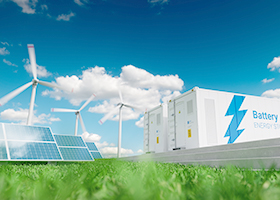Novel Nanomaterials for Energy Storage Systems
A special issue of ChemEngineering (ISSN 2305-7084).
Deadline for manuscript submissions: closed (28 February 2022) | Viewed by 854

Special Issue Editor
Interests: electrochemical energy storage technology; advanced characterization of battery materials; Li-battery; green chemistry; nanomaterials; structure–property relationship; synthesis of nanomaterials; high-throughput chemistry; sensing and electrocatalysis; solid-state electrolyte; Li-rich cathode; energy policy
Special Issues, Collections and Topics in MDPI journals
Special Issue Information
Dear Colleagues,
The urgency of the global climate crisis and shift toward sustainable energy, along with the advent and growth of the portable electronics era, have illustrated the immediate need for improved high-performance electrochemical energy storage devices. To overcome the imminent depletion of non-renewable energy in the foreseeable future, researchers have focused on various sustainable energy conversion devices, including fuel cells, solar cells, wind, and tidal waves to increase the intermittency of renewable energy generation systems. Among various energy storage and conversion devices, batteries, supercapacitors, and fuel cells (electrocatalysis) play a vital role that can store energy on a large scale and can increase the use of variable renewable resources. These electrochemical technologies are currently hampered by low-performance and higher operating costs. At present, the search for sustainable, secure, and active energy storage solutions is critical for large-scale implementation and the efficiency expected.
This Special Issue covers recent advances in renewable energy conversion and storage, sensing, and electrical catalysis technologies. We therefore invite papers on scientific advances, new findings, case studies, reviews, as well as analyses, and numerical simulation that highlight the development of novel nanomaterials for energy storage and conversion devices.
Articles selected for this Special Issue are subject to a rigorous peer review procedure with the aim of rapid and wide dissemination of research results, developments, and applications. We are writing to invite you to submit your original work/review articles/perspectives to this Special Issue. We look forward to receiving your outstanding research findings.
Dr. Sarish Rehman
Guest Editor
Manuscript Submission Information
Manuscripts should be submitted online at www.mdpi.com by registering and logging in to this website. Once you are registered, click here to go to the submission form. Manuscripts can be submitted until the deadline. All submissions that pass pre-check are peer-reviewed. Accepted papers will be published continuously in the journal (as soon as accepted) and will be listed together on the special issue website. Research articles, review articles as well as short communications are invited. For planned papers, a title and short abstract (about 250 words) can be sent to the Editorial Office for assessment.
Submitted manuscripts should not have been published previously, nor be under consideration for publication elsewhere (except conference proceedings papers). All manuscripts are thoroughly refereed through a single-blind peer-review process. A guide for authors and other relevant information for submission of manuscripts is available on the Instructions for Authors page. ChemEngineering is an international peer-reviewed open access monthly journal published by MDPI.
Please visit the Instructions for Authors page before submitting a manuscript. The Article Processing Charge (APC) for publication in this open access journal is 1800 CHF (Swiss Francs). Submitted papers should be well formatted and use good English. Authors may use MDPI's English editing service prior to publication or during author revisions.
Keywords
- Electrochemical energy materials
- Energetic materials
- Fuel cells
- Nanostructured electrolyte
- Electrolytes
- Renewable energy
- Structure–property relationship
- Novel synthesis techniques for electrode
- Photocatalysis
- Green energy
- Energy saving and efficiency
Benefits of Publishing in a Special Issue
- Ease of navigation: Grouping papers by topic helps scholars navigate broad scope journals more efficiently.
- Greater discoverability: Special Issues support the reach and impact of scientific research. Articles in Special Issues are more discoverable and cited more frequently.
- Expansion of research network: Special Issues facilitate connections among authors, fostering scientific collaborations.
- External promotion: Articles in Special Issues are often promoted through the journal's social media, increasing their visibility.
- Reprint: MDPI Books provides the opportunity to republish successful Special Issues in book format, both online and in print.
Further information on MDPI's Special Issue policies can be found here.





